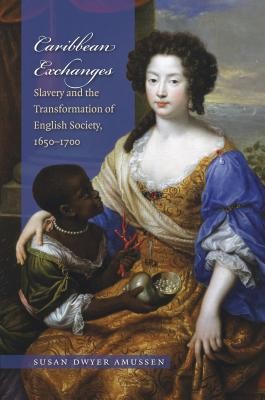
- We will send in 10–14 business days.
- Author: Susan Dwyer Amussen
- Publisher: University of North Carolina Press
- ISBN-10: 0807858544
- ISBN-13: 9780807858547
- Format: 15.4 x 22.5 x 2 cm, softcover
- Language: English
- SAVE -10% with code: EXTRA
Reviews
Description
English colonial expansion in the Caribbean was more than a matter of migration and trade. It was also a source of social and cultural change within England. Finding evidence of cultural exchange between England and the Caribbean as early as the seventeenth century, Susan Dwyer Amussen uncovers the learned practice of slaveholding.
As English colonists in the Caribbean quickly became large-scale slaveholders, they established new organizations of labor, new uses of authority, new laws, and new modes of violence, punishment, and repression in order to manage slaves. Concentrating on Barbados and Jamaica, England's two most important colonies, Amussen looks at cultural exports that affected the development of race, gender, labor, and class as categories of legal and social identity in England. Concepts of law and punishment in the Caribbean provided a model for expanded definitions of crime in England; the organization of sugar factories served as a model for early industrialization; and the construction of the "white woman" in the Caribbean contributed to changing notions of "ladyhood" in England. As Amussen demonstrates, the cultural changes necessary for settling the Caribbean became an important, though uncounted, colonial export.
EXTRA 10 % discount with code: EXTRA
The promotion ends in 6d.10:02:03
The discount code is valid when purchasing from 10 €. Discounts do not stack.
- Author: Susan Dwyer Amussen
- Publisher: University of North Carolina Press
- ISBN-10: 0807858544
- ISBN-13: 9780807858547
- Format: 15.4 x 22.5 x 2 cm, softcover
- Language: English English
English colonial expansion in the Caribbean was more than a matter of migration and trade. It was also a source of social and cultural change within England. Finding evidence of cultural exchange between England and the Caribbean as early as the seventeenth century, Susan Dwyer Amussen uncovers the learned practice of slaveholding.
As English colonists in the Caribbean quickly became large-scale slaveholders, they established new organizations of labor, new uses of authority, new laws, and new modes of violence, punishment, and repression in order to manage slaves. Concentrating on Barbados and Jamaica, England's two most important colonies, Amussen looks at cultural exports that affected the development of race, gender, labor, and class as categories of legal and social identity in England. Concepts of law and punishment in the Caribbean provided a model for expanded definitions of crime in England; the organization of sugar factories served as a model for early industrialization; and the construction of the "white woman" in the Caribbean contributed to changing notions of "ladyhood" in England. As Amussen demonstrates, the cultural changes necessary for settling the Caribbean became an important, though uncounted, colonial export.


Reviews